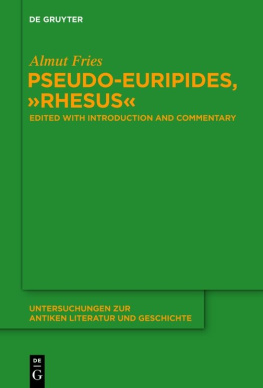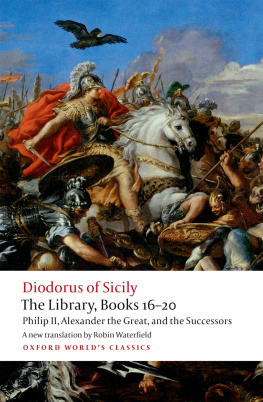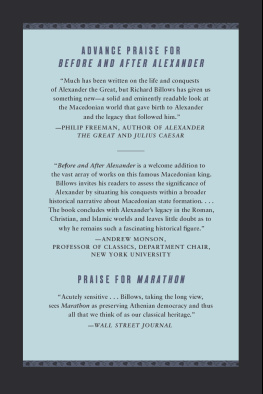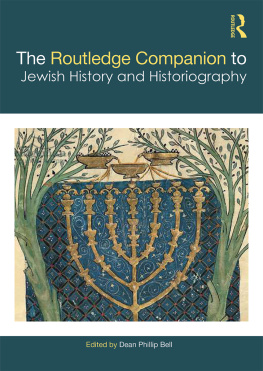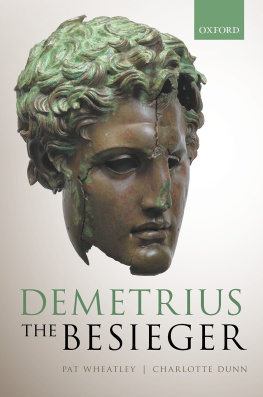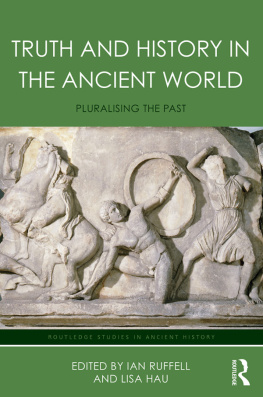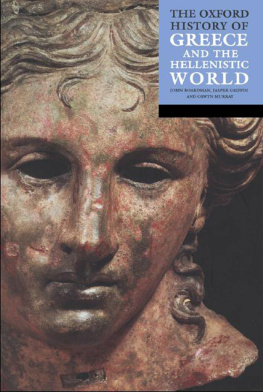Untersuchungen zur antiken Literatur und Geschichte
Edited by
Marcus Deufert
Heinz-Gnther Nesselrath
Peter Scholz
Volume
ISBN 9783110741957
e-ISBN (PDF) 9783110743821
e-ISBN (EPUB) 9783110743869
Bibliographic information published by the Deutsche Nationalbibliothek
The Deutsche Nationalbibliothek lists this publication in the Deutsche Nationalbibliografie; detailed bibliographic data are available on the Internet at http://dnb.dnb.de.
2022 Walter de Gruyter GmbH, Berlin/Boston
optimo magistro
Hans Hauben
Preface
This book is a revised and expanded version of the doctoral dissertation I defended at the University of Leuven in 2009. I owe an enormous debt of gratitude to my supervisor, Hans Hauben, for everything he has taught me about ancient history, research methods, and writing clearly and concisely, as well as for his enormous intellectual honesty. His advice and meticulous criticism have been indispensable, and his critical reading of the manuscript has led to countless improvements. To the other members of the dissertation committee, Johannes Engels, Guido Schepens, Stefan Schorn, and Peter Van Nuffelen, I am also very grateful for their invaluable comments which have been extremely helpful in turning the thesis into a book.
For reading parts of the manuscript at various stages my thanks go to Christoph Begass, Aude Cohen-Skalli, Tom Deneire, Bram Fauconnier, Lisa Irene Hau, Hubert Meeus, Sofie Remijsen, Brian Sheridan, Jan Tavernier, Dorothy Thompson, and Shane Wallace. Whenever I needed advice on philological matters, I could call on Willy Clarysse, Tom Deneire, Ilse De Vos, Erika Gielen, and especially Aude Cohen-Skalli, who always answered my questions about textual criticism both very swiftly and very thoroughly. Jan Bollanse has been equally generous with his time and his expertise in the field of ancient historiography, and so have Tom Boiy and Jan Tavernier for the many issues of Ancient Near Eastern history that confront the commentator of Diodoros XIXth book. Bart Van Beek, in turn, knew how to solve any computer problem. From the bibliography it will be clear how a large a debt I owe to the published work of several experts in Hellenistic history and historiography. The scholars from whose knowledge I have benefitted in conversations over the years are too numerous to mention, but those who have been particularly supportive of me deserve a special mention: Edward Anson, Elizabeth Carney, Hans-Joachim Gehrke, Waldemar Heckel, John Marincola, John Moles, Joseph Roisman, Robin Waterfield, and Pat Wheatley.
I would like to extend my gratitude to the editors of Untersuchungen zur antiken Literatur und Geschichte, Marcus Deufert, Heinz-Gnther Nesselrath and Peter Scholz, not only for including the book in their series but also for their thorough reading of the manuscript and their many helpful suggestions and corrections. To Willard Paul Meaker and Michael Park I am indebted for correcting my English, and to Robin Mssinger and Leon Groe-Stoltenberg for their help with the bibliography. Annika Mller assisted valuably with the checking of the proofs. For the excellent collaboration in the book's production process I would like to thank Benedikt Krger at Walter De Gruyter and Katharina Ehlgen at Datagroup Deutschland.
My doctoral research from 2005 to 2009 was generously funded by the University of Leuvens Research Council, and a Leverhulme Visiting Fellowship at the University of Wales Trinity Saint David in Lampeter was very beneficial in allowing me to work on revising and expanding the thesis in 2010/11. Ever since I arrived at the University of Mannheim in September 2015, Christian Mann has been extremely supportive and provided the ideal work environment in which I could finish the book manuscript. I would also like to thank the Verein zur Frderung des Historischen Instituts und des Antikensaals an der Universitt Mannheim e.V. for kindly subsidising part of the publication costs.
I am very grateful to my parents, Hubert Meeus and Carla Vanvinckenroy, for their constant encouragement and support in academic and non-academic matters: they have literally been there whenever I needed it. Last but not least, the limited belief that tends to be awarded to prefatory topoi and the magnitude of my debt to her make it impossible adequately to express my gratitude to my wife, Melanie Meaker: nothing I can write could even begin to describe how much I owe to her in every other aspect of life and in finishing this book, which would never have happened without her.
Introduction
Diodoros of Sicily wrote a universal history in forty books entitled Bibliotheke in the first century BCE. Only fifteen books (IV, XIXX) have been preserved more or less intact. In books XVIIIXX Diodoros dealt mainly with the history of the Successors of Alexander the Great (Diadochoi) from 323 until 302 BCE. Constituting the only continuous account of the period which provides at least a certain amount of detail, Diodoros XVIIIXX is of utmost importance for the study of the Diadoch period since all contemporary histories are lost. It is all the more surprising, therefore, that only few studies about these books exist, except for the particular problems of the chronology of the narrative and of its sources. Because Diodoros is usually considered a compiler who hardly elaborates his sources, the need has apparently not been felt to study many other aspects of the text.
The need for a commentary on Diodoros work has often been pointed out, The chapters on Sicilian and Italian affairs will not be treated here, as they present a whole set of very different problems that require a detailed investigation of their own.
Several approaches are possible when commenting on a historiographical text, as is apparent from the existing commentaries on Diodoros. Analysis of the reported events, Quellenforschung, textual criticism, and the study of Diodoros methods and interests are all relevant and cannot simply be separated from each other. Within this framework, of course, it remains to select the issues on which to comment, as it is not possible, or perhaps even desirable, to discuss every single question the text may raise for the reader who can approach it from several different angles. An obvious first criterion is that I have commented on all persons and institutions named in the text, as well as on all places except for passing references to particularly well-known ones. I also comment on what seemed to me the most important historical questions raised by the text and on anything which in my view might shed light on Diodoros historiographical practice. Obviously, any indications relevant to the question of Diodoros sources have been analysed, which seems particularly significant given the weight which has traditionally been attached to Diodorean Quellenforschung in studies on the Diadoch period. Of course, much of this is to a certain extent arbitrary in that it depends not only on the judgement of what is relevant but also on whether one notices a particular problem.
Several recent studies, reacting to the extremely dismissive views about Diodoros held by earlier generations of scholars, have sometimes tended to downplay or ignore the obvious and less obvious shortcomings of Diodoros work.
In book XIX Diodoros treats the history of the Successors from the autumn of 317 until the autumn of 311. While he often is the only source for the events he describes, other versions are available for certain episodes. Plutarch also deals with the period in his lives of Eumenes and Demetrios, as does Nepos in his biography of the former. Justins epitome of Pompeius Trogus offers summary accounts of some of the events described in Diodoros XIX. Book IV of Polyainos


